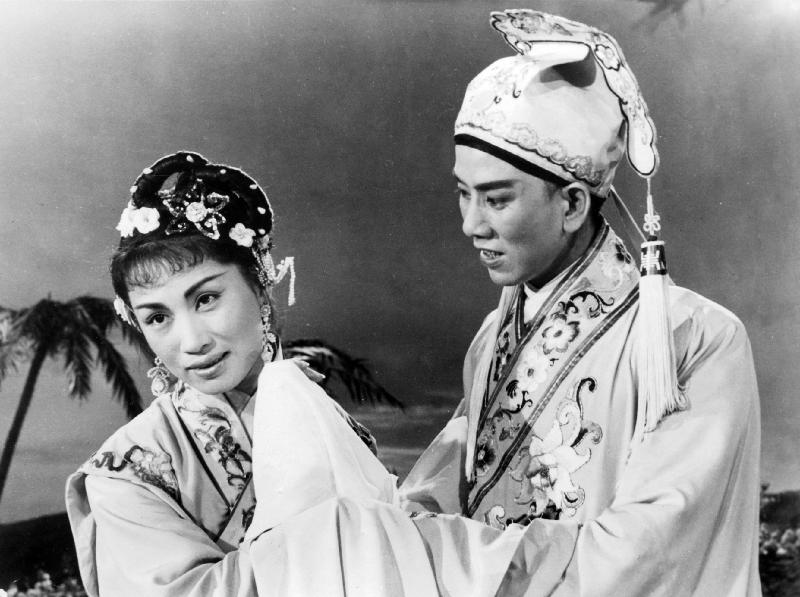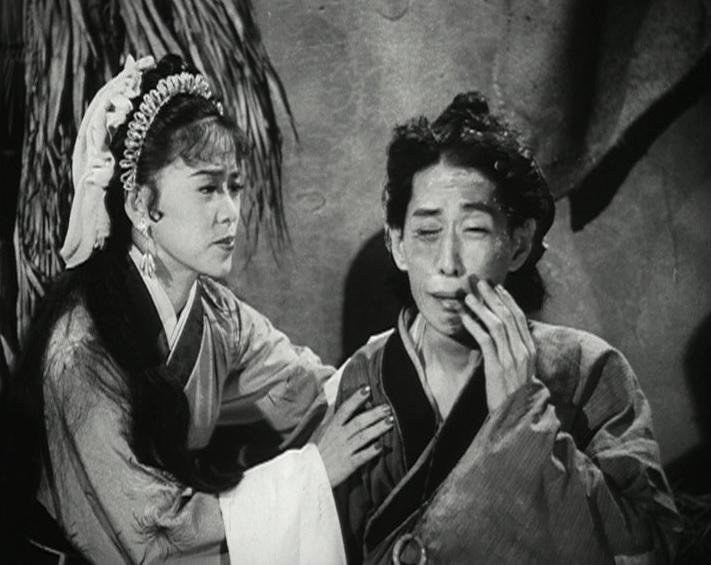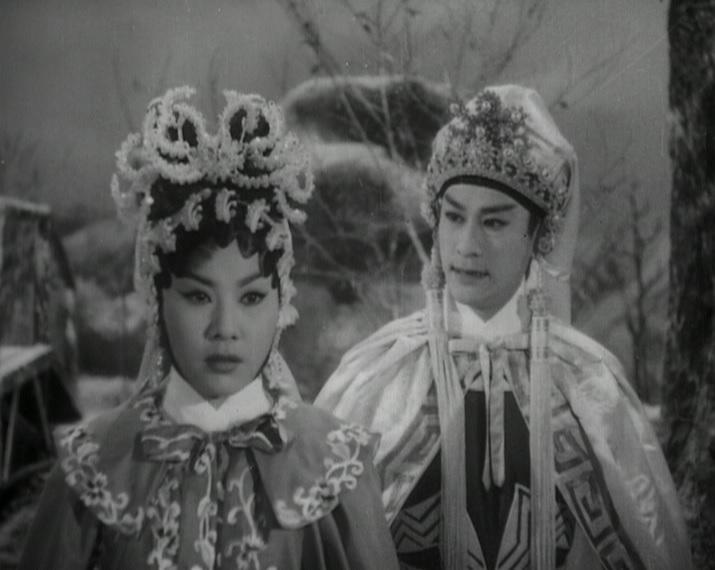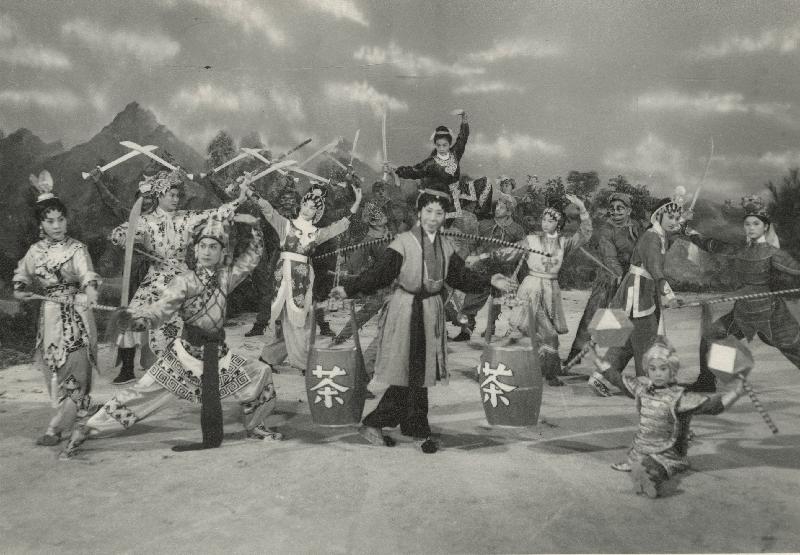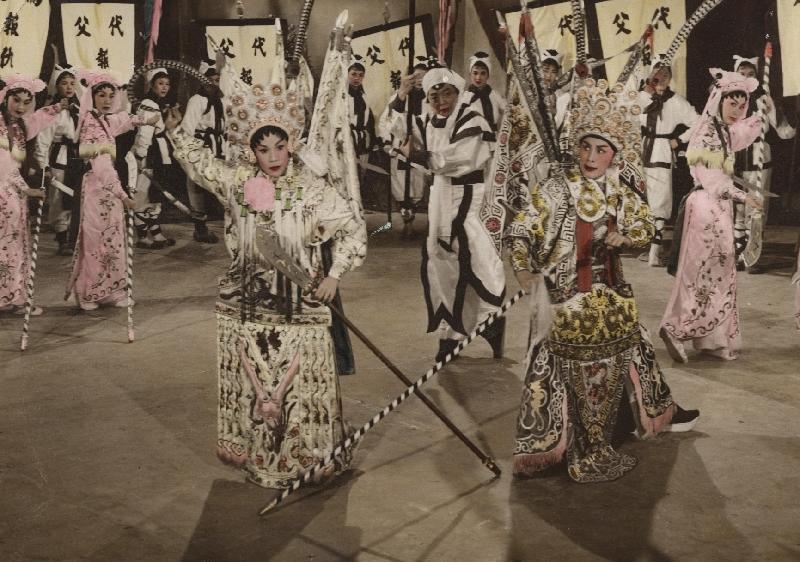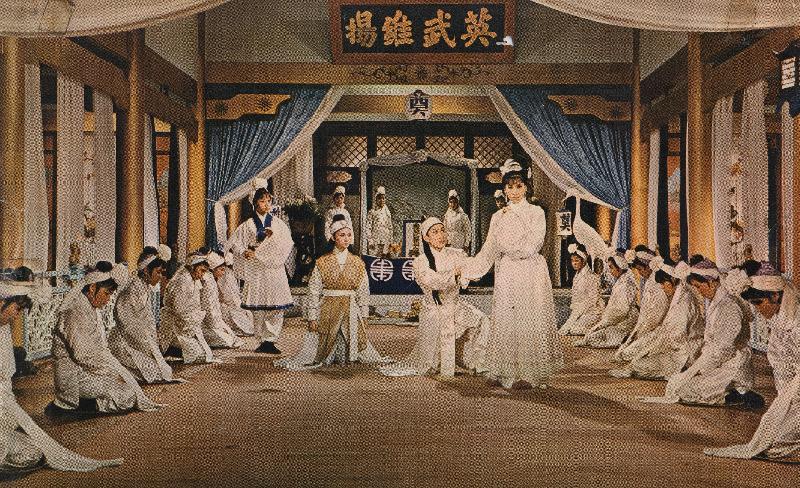The Hong Kong Film Archive (HKFA) of the Leisure and Cultural Services Department will present "Celebrating Inheritance and Integration – 10th Anniversary of Inscription of Cantonese Opera onto Representative List of the Intangible Cultural Heritage of Humanity" as part of the "Morning Matinee" series at 11am on Fridays from September to December. Fourteen Cantonese opera films will be screened, enabling film buffs to revisit the exquisite singing prowess and martial stunts of Cantonese opera stars.
Some of the films will be accompanied by post-screening talks, to be hosted by acclaimed Cantonese film actress Shum Chi-wah, young Cantonese opera talent Ng Lap-hei, Cantonese opera and film study experts Dr Lum Man-yee, Dr Stephanie Ng and Yuen Tsz-ying. The talks will be conducted in Cantonese with free admission.
Sun Ma Si-tsang was a rare performer equally well versed in Cantonese opera and Peking opera. In "A Patriot's Sword" (1958), his signature vocal style "Sun Ma style" finds full expression. In a critical scene, he uses Peking opera vocal techniques infused with the "Sun Ma style" to express his character’s excruciating pain and sorrow before exacting vengeance, pushing the whole drama towards its climax.
"Emperor Kwong Sui's Nocturnal Sacrifice to Concubine Zhen" (1952) is an entertaining and appealing film. It features Leung Mo-sheung playing the Emperor Kwong Sui (aka Guangxu) and singing the theme song, Yu Lai-zhen demonstrating her eminent "Mui style" as Concubine Zhen, and Leung Sing-por giving a hilarious performance.
Adapted from a representative Cantonese opera of Ho Fei-fan, "The Romantic Monk" (1956) solidifies Ho's persona as the "romantic monk". Starring as Jia Baoyu in the film, Ho delivers a knockout 12-minute singing performance of "Baoyu Leaves Home for Monkhood" to charm the audience.
In "The Lost Kite" (1957), Hung Sin Nui plays a clever, courageous and sweet-looking maidservant, and she showcases her special vocal technique "Hung style" in the scenes "Love in the First Encounter" and "Lament to Self in the Woodshed". In addition, the scene "Reflections under the Moonlight" is a remarkable performance from Ma Si-tsang's late career period, displaying his delicate and decent vocal style that highlights the righteous and optimistic personalities of his role.
Dubbed the "Queen of huadan (female lead)", Fong Yim-fun played dual roles as twin sisters in "Spring's Joyous Blessings" (1958). She switches perfectly between acting that is physical and dramatic to portray the incompatible personalities of the two characters. Fong further demonstrates her versatility later when she cross-dresses as a brave warrior to save Ho Fei-fan, who plays a general.
"Lust is the Worst Vice" (1963) uses two classic songs of Sun Ma Si-tsang, "Begging for Food" and "Lament of the Jade Sheng", as recurring motifs to convey the film’s moral message. Sun Ma’s mastery of falsetto singing, his impressive vocal range and the clarity of his notes are unparalleled to this very day.
"Two Heroes" (1961) marks the grown-up return of a child prodigy, Yu Kai. The movie is a notable work showing Yu's martial arts feats, in which he fights multiple enemies on his own.
"Drums along the Battlefield" (1963) is adapted from the Cantonese opera work in which Lam Kar-sing played his first male leading civil and military role. The same opera cast performed in this cinematic adaptation as well. In the showdown, Lam fully displays his northern fighting style and dazzling skills like hair-swirling and body-spinning, clearly cementing his place as a serious leading man of Cantonese opera.
Featuring Lam Kar-sing, Yu Lai-zhen, Poon Yat On and Lee Hong-kum, the fantasy treasure "Holy Snake and Flying Tiger" (1961) tells the classic story of the Queens of the Eastern and the Western Chambers. The film makes good use of special effects to create a fantastical atmosphere and preserves the martial feats and postures of Cantonese opera.
"General Kwan Guards the Huarong Path Lau Bei Crosses the River to Meet his Bride" (1957) highlights Leng Wah Hang's powerful martial arts skills in the role of the formidable General Kwan (aka Guan Yu). She manipulates a heavy long broadsword in traditional postures and fighting scenes while Leung Siu-chung, the "Somersault King", shows his stunning acrobatic talents in his role as a stable boy.
Renowned Peking opera diva Fen Ju Hua and her disciples give a remarkable performance in "The Capture of the Evil Demons" (1962). By playing a tea-selling lady who conquers demons in the final scene, Fen impresses the audience with her legendary water bucket balancing acrobatics – a performance that is rarely shown onscreen.
Acting alongside his younger brother Mak Sin-sing in "An Agnostic and Sagacious Intercession" (1962), Mak Bing-wing puts on a display of fiery passion and stages combat with his fiancée Fung Wong Nui that involves a 20-second hair-swirling stunt. The film is also a cinematic gem for holding the traditional performance formula of the act "Prime Minister of Six States", featuring Lan Chi Pak's unique carriage-riding skills and performances by Yau Sing-po, Yuen Siu-fai and Lam Kam-tong as marshals.
Starring Yam Kim-fai and Yu Lai-zhen, "Golden Phoenix and Dragon" (1961) is accentuated by nine consummately trained acrobatic acts including hair flinging, leg twirling, somersaults, helmet picking and wielding pheasant plumes. Yam and Yu show off their spectacular operatic martial skills in a 30-minute revenge fighting scene that leads to the film’s climax.
"The Story of Heroine Fan Lei-fa" (1968) was a novelty for audiences at the time of its release as the singing performance was in Cantonese while adopting the popular operatic rhythms of the 1960s. It also retained traditional operatic flavours with the playing of gongs and drums in the battle scenes. Connie Chan Po-chu not only sings solo in falsetto voice, but even makes a breakthrough by taking up the female warrior role for the first time as the Tang dynasty female general Fan Lei-fa. Furthermore, the cross-dressing performance by renowned female comedian Tam Lan-hing adds plenty of amusement in the film.
All the films are in Cantonese. All films except "Emperor Kwong Sui's Nocturnal Sacrifice to Concubine Zhen" have Chinese lyrics displayed onscreen.
Tickets priced at $30 are now available at URBTIX (www.urbtix.hk). For credit card telephone bookings, please call 2111 5999. For programme details, please call 2739 2139 or visit www.lcsd.gov.hk/CE/CulturalService/HKFA/en_US/web/hkfa/programmesandexhibitions/programmes/chinese-opera/index.html.
Follow this news feed: East Asia







